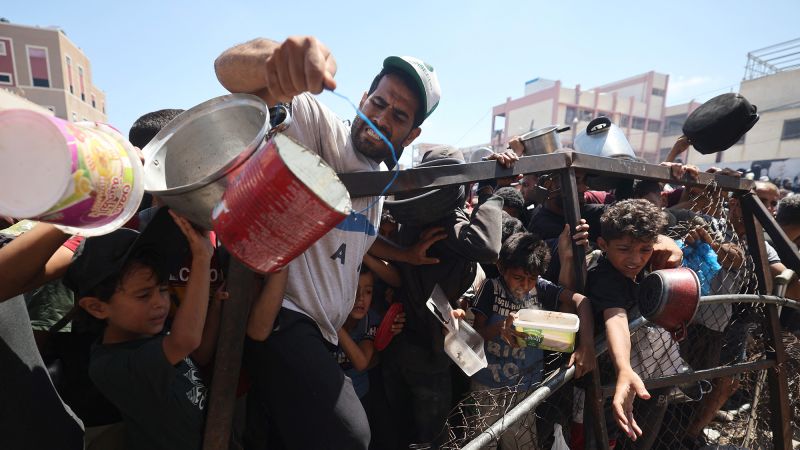The situation in Gaza has emerged as a critical focal point in international diplomacy, particularly with the recent decision by the United States to recall its negotiating team from Doha. This decision comes amidst increasingly tense discussions aimed at reaching a ceasefire to end the ongoing conflict in the region. The U.S. Special Envoy, Steve Witkoff, expressed disappointment over Hamas’s latest response to proposed ceasefire terms, indicating a “clearly shows a lack of desire to reach a ceasefire.” This shift in the U.S. stance raises questions about the future of diplomatic efforts to restore peace in the region, especially considering the dire humanitarian conditions faced by the Gazan people.
In light of Hamas’s perceived unwillingness to cooperate, Witkoff announced that the U.S. would explore other options to secure the release of hostages and foster a more stable environment in Gaza. Although he refrained from detailing these alternative strategies, the implication is clear: the U.S. may pivot towards different approaches in handling the complexities of this crisis. His remarks were starkly contrasted with earlier optimism expressed by diplomatic sources, who had hinted at potential progress following Hamas’s recent proposals. This sudden change in tone casts doubt on the prospects of achieving a ceasefire, as it seems to signal a deeper divide between the negotiating parties.
Moreover, the lack of a ceasefire exacerbates the already catastrophic humanitarian crisis in Gaza, where numerous residents are at risk of starvation due to the ongoing Israeli restrictions on aid. The United Nations has reported alarming conditions under which many are suffering, raising urgent warnings that the survival of many people hangs in the balance. Witkoff underscored the serious implications of the stalled discussions, stating that mediators had exerted significant effort but ultimately concluded that Hamas is either uncoordinated or acting in bad faith. His sentiments underscored both frustration and urgency for a resolution, highlighting the overwhelming need to address humanitarian concerns amid ongoing violence.
In response to the shifting landscape of negotiations, Israel also recalled its negotiating team from Qatar, though sources within the Israeli government clarified that this move was not indicative of a crisis. Instead, it was a necessary step to reassess their position on negotiations, emphasizing the challenges inherent in remote diplomacy. Interestingly, another official, familiar with the talks, had previously characterized Hamas’s response as “positive,” suggesting there were areas of potential agreement despite existing gaps. This disparity in interpretations underscores the complexities and fluidity of the situation on the ground.
As these developments unfold, the humanitarian situation in Gaza remains dire. Civilians are bearing the brunt of the conflict, with aid drastically restricted due to governmental policies. The toll of starvation is rising daily, with international organizations increasingly voicing concern over the escalating crisis. Despite the urgent need for humanitarian assistance, Israeli restrictions continue to impede aid flow into the beleaguered territory, contributing to the escalating mortality rates among civilians.
Historically, there have been fluctuations in the U.S. government’s approach to humanitarian aid in the region, with differing levels of engagement during various administrations. While the Biden administration appointed dedicated officials to navigate the complexities of humanitarian access in Gaza, the Trump administration displayed a markedly different stance, emphasizing partnerships with controversial entities like the Gaza Humanitarian Foundation (GHF). Reports have surfaced regarding violence surrounding GHF aid distribution sites, further complicating the already challenging aid landscape.
As these scenarios unfold, the U.S. government’s continued emphasis on the GHF and reluctance to explore additional avenues for aid delivery in the absence of a ceasefire raises critical questions about their long-term strategy. Spokesperson Tommy Pigott acknowledged the humanitarian catastrophe while reiterated support for the GHF, underscoring a commitment to ensuring that aid does not fall into the hands of Hamas. Nevertheless, the pressing need for actionable solutions to alleviate the suffering in Gaza cannot be overlooked.
The implications of these discussions extend beyond mere diplomacy; they directly affect the lives of countless individuals suffering in Gaza. The urgency of providing aid cannot be overstated, and the world watches closely as negotiations proceed amidst escalating tensions and humanitarian crises. Moving forward, addressing the plight of the Gazan people remains paramount, as the clock ticks down and desperation deepens on the ground.











